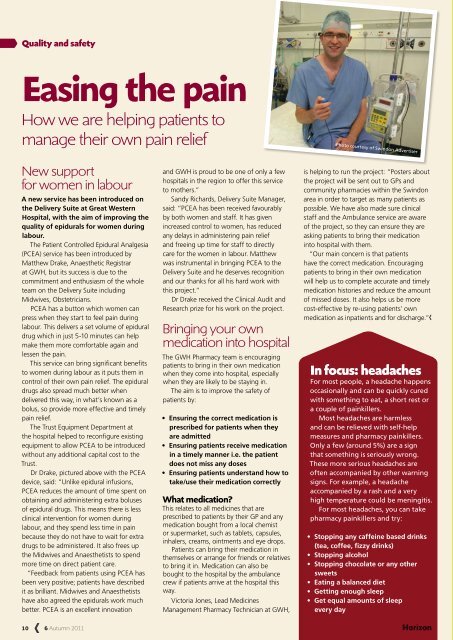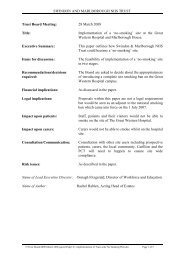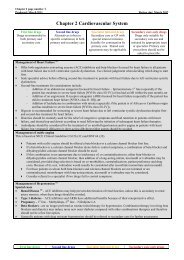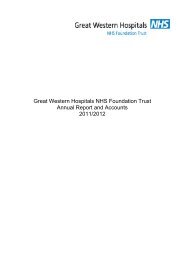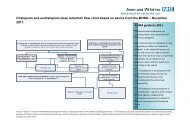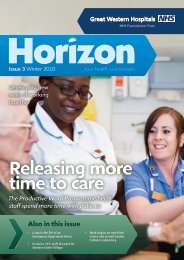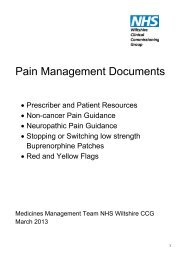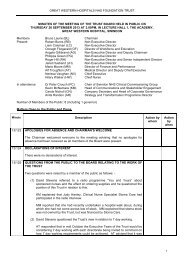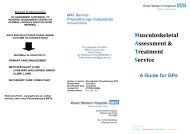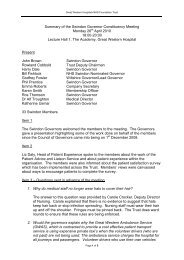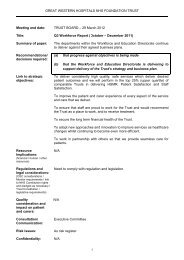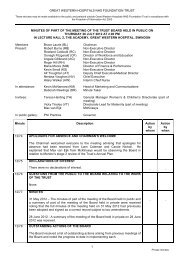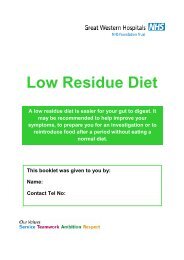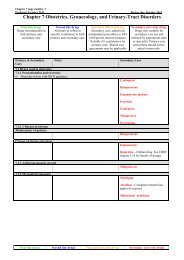Issue 6 - The Great Western Hospital
Issue 6 - The Great Western Hospital
Issue 6 - The Great Western Hospital
You also want an ePaper? Increase the reach of your titles
YUMPU automatically turns print PDFs into web optimized ePapers that Google loves.
Photo courtesy of Swindon Advertiser<br />
Quality and safety<br />
Easing the pain<br />
How we are helping patients to<br />
manage their own pain relief<br />
New support<br />
for women in labour<br />
A new service has been introduced on<br />
the Delivery Suite at <strong>Great</strong> <strong>Western</strong><br />
<strong>Hospital</strong>, with the aim of improving the<br />
quality of epidurals for women during<br />
labour.<br />
<strong>The</strong> Patient Controlled Epidural Analgesia<br />
(PCEA) service has been introduced by<br />
Matthew Drake, Anaesthetic Registrar<br />
at GWH, but its success is due to the<br />
commitment and enthusiasm of the whole<br />
team on the Delivery Suite including<br />
Midwives, Obstetricians.<br />
PCEA has a button which women can<br />
press when they start to feel pain during<br />
labour. This delivers a set volume of epidural<br />
drug which in just 5-10 minutes can help<br />
make them more comfortable again and<br />
lessen the pain.<br />
This service can bring significant benefits<br />
to women during labour as it puts them in<br />
control of their own pain relief. <strong>The</strong> epidural<br />
drugs also spread much better when<br />
delivered this way, in what’s known as a<br />
bolus, so provide more effective and timely<br />
pain relief.<br />
<strong>The</strong> Trust Equipment Department at<br />
the hospital helped to reconfigure existing<br />
equipment to allow PCEA to be introduced<br />
without any additional capital cost to the<br />
Trust.<br />
Dr Drake, pictured above with the PCEA<br />
device, said: “Unlike epidural infusions,<br />
PCEA reduces the amount of time spent on<br />
obtaining and administering extra boluses<br />
of epidural drugs. This means there is less<br />
clinical intervention for women during<br />
labour, and they spend less time in pain<br />
because they do not have to wait for extra<br />
drugs to be administered. It also frees up<br />
the Midwives and Anaesthetists to spend<br />
more time on direct patient care.<br />
“Feedback from patients using PCEA has<br />
been very positive; patients have described<br />
it as brilliant. Midwives and Anaesthetists<br />
have also agreed the epidurals work much<br />
better. PCEA is an excellent innovation<br />
and GWH is proud to be one of only a few<br />
hospitals in the region to offer this service<br />
to mothers.”<br />
Sandy Richards, Delivery Suite Manager,<br />
said: “PCEA has been received favourably<br />
by both women and staff. It has given<br />
increased control to women, has reduced<br />
any delays in administering pain relief<br />
and freeing up time for staff to directly<br />
care for the women in labour. Matthew<br />
was instrumental in bringing PCEA to the<br />
Delivery Suite and he deserves recognition<br />
and our thanks for all his hard work with<br />
this project.”<br />
Dr Drake received the Clinical Audit and<br />
Research prize for his work on the project.<br />
Bringing your own<br />
medication into hospital<br />
<strong>The</strong> GWH Pharmacy team is encouraging<br />
patients to bring in their own medication<br />
when they come into hospital, especially<br />
when they are likely to be staying in.<br />
<strong>The</strong> aim is to improve the safety of<br />
patients by:<br />
• Ensuring the correct medication is<br />
prescribed for patients when they<br />
are admitted<br />
• Ensuring patients receive medication<br />
in a timely manner i.e. the patient<br />
does not miss any doses<br />
• Ensuring patients understand how to<br />
take/use their medication correctly<br />
What medication?<br />
This relates to all medicines that are<br />
prescribed to patients by their GP and any<br />
medication bought from a local chemist<br />
or supermarket, such as tablets, capsules,<br />
inhalers, creams, ointments and eye drops.<br />
Patients can bring their medication in<br />
themselves or arrange for friends or relatives<br />
to bring it in. Medication can also be<br />
bought to the hospital by the ambulance<br />
crew if patients arrive at the hospital this<br />
way.<br />
Victoria Jones, Lead Medicines<br />
Management Pharmacy Technician at GWH,<br />
is helping to run the project: “Posters about<br />
the project will be sent out to GPs and<br />
community pharmacies within the Swindon<br />
area in order to target as many patients as<br />
possible. We have also made sure clinical<br />
staff and the Ambulance service are aware<br />
of the project, so they can ensure they are<br />
asking patients to bring their medication<br />
into hospital with them.<br />
“Our main concern is that patients<br />
have the correct medication. Encouraging<br />
patients to bring in their own medication<br />
will help us to complete accurate and timely<br />
medication histories and reduce the amount<br />
of missed doses. It also helps us be more<br />
cost-effective by re-using patients' own<br />
medication as inpatients and for discharge.”<br />
In focus: headaches<br />
For most people, a headache happens<br />
occasionally and can be quickly cured<br />
with something to eat, a short rest or<br />
a couple of painkillers.<br />
Most headaches are harmless<br />
and can be relieved with self-help<br />
measures and pharmacy painkillers.<br />
Only a few (around 5%) are a sign<br />
that something is seriously wrong.<br />
<strong>The</strong>se more serious headaches are<br />
often accompanied by other warning<br />
signs. For example, a headache<br />
accompanied by a rash and a very<br />
high temperature could be meningitis.<br />
For most headaches, you can take<br />
pharmacy painkillers and try:<br />
• Stopping any caffeine based drinks<br />
(tea, coffee, fizzy drinks)<br />
• Stopping alcohol<br />
• Stopping chocolate or any other<br />
sweets<br />
• Eating a balanced diet<br />
• Getting enough sleep<br />
• Get equal amounts of sleep<br />
every day<br />
10 6 Autumn 2011


